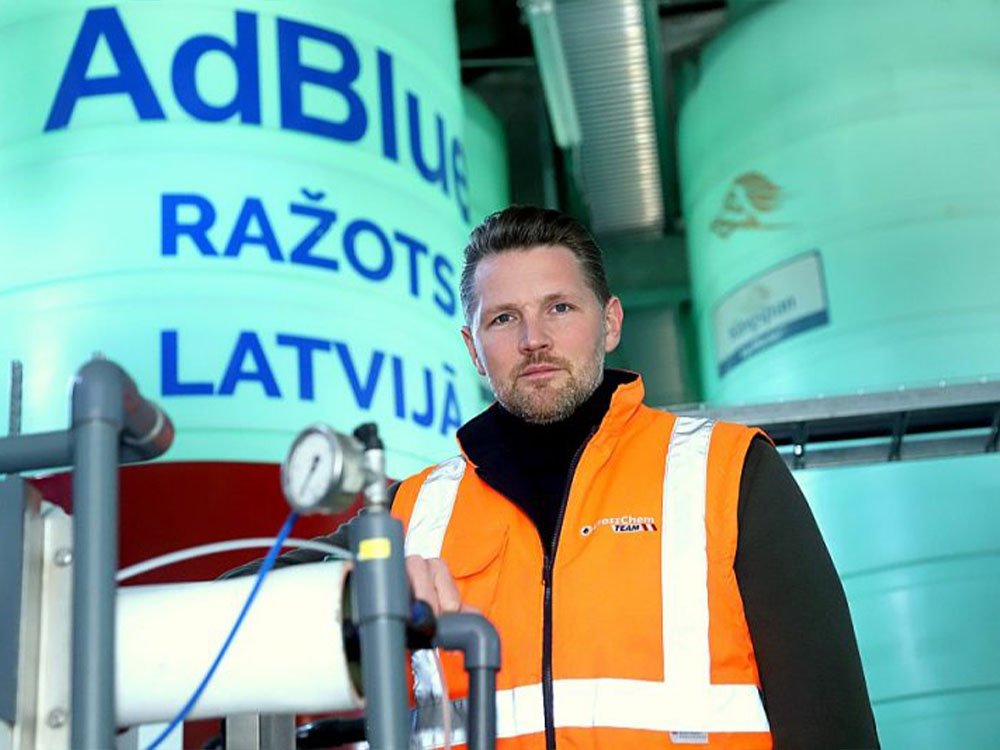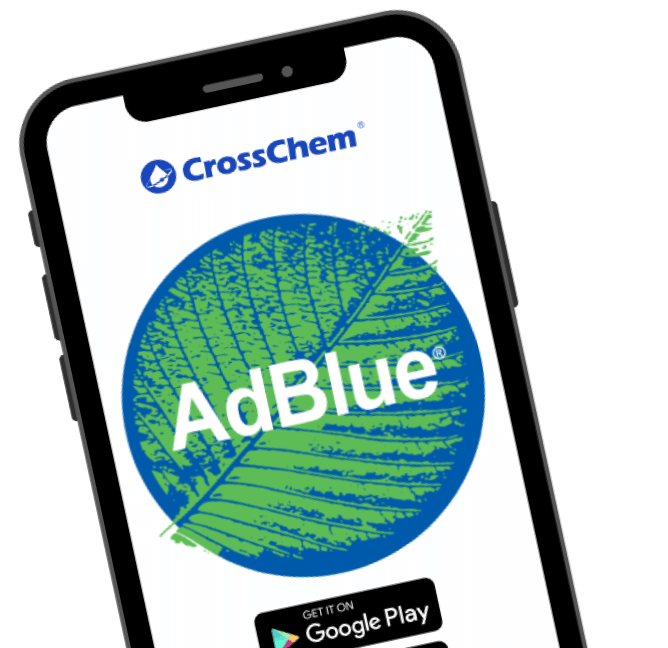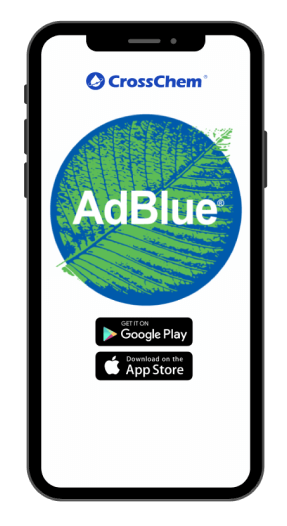If you’re not driving a heavy vehicle or one of the new diesel cars, you probably didn’t know that there is an AdBlue tank next to the diesel tank that reduces emissions.
It literally makes the world cleaner. In addition, this miraculous liquid is produced here in Olaine, exporting to more than 50 countries.
“CrossChem” is a 100% Latvian company, no crumbs of foreign capital have been injected into it, says Richard Anderson, a member of the company’s board. Since 2012, the company has been the only manufacturer of fuel additive “AdBlue” accredited by the German Automobile Industry Association VDA in the Baltics.
“Do not use just put any random AdBlue product in the car, although it may seem that every single one is the same. It is important to buy only the product of an accredited manufacturer, given how complicated the product is. Even small deviations from the standard cost tens of thousands. ”
So what is it about a liquid? Slightly chemical and very simplified – it is a solution of urea in water, which is not toxic and harmful to humans and the environment. The purpose of AdBlue is to neutralize nitrogen oxides (NOx) from all diesel engines. Importantly, AdBlue can only be used in vehicles equipped with a selective catalytic reduction system (SCR).
Richard points out that AdBlue neutralizes about 98% of all diesel emissions. It is important that AdBlue is a completely separate substance from the engine and fuel, which is injected directly into the exhaust system from specially designed tanks – the ammonia in the liquid neutralizes NOx.
In principle, AdBlue cleans the exhaust system, resulting in harmless nitrogen and water vapor coming out of the muffler.
Studies have shown that a car with AdBlue intakes much dirtier air while driving than it blows from the exhaust. If we want to clean the air in the city, then we have to let diesels with AdBlue run through the city, ”Anderson is convinced.
About 83% of the company’s total production is AdBlue, but only a fraction of this is passenger transport – most is used by ships, tractors, heavy trucks, construction and other heavy machinery.
The remaining 17% is made up of other CrossChem products – liquid fertilisers, windscreen fluids, antifreeze, anti-friction oils, and the company also produces a marine “urea” product used by ships to reduce emissions.
The company also offers rail terminal services, manufactures AdBlue production equipment for sale and operates a network of AdBlue filling stations.
“We are going into segments related to agriculture, trying to develop products that are environmentally friendly – we see ourselves as providers of a cleaner environment. We are looking at everything where there is a possibility to streamline processes.
It takes about 4-5 years to develop and test a product. We also work a lot with Riga Technical University, who do various tests and studies.”
The railway terminal at the Olaine plant is one of the biggest assets, as it allows the company to receive the raw materials needed to manufacture products in large volumes. The company has been based here for five years, having moved from Riga.
He does not have many good words to say about doing business in the capital. “We bought three hectares of land in Riga, invested half a million euros – electricity, gas, landscaping – but the management told us we were not welcome in Riga as a chemical company.
But in Olaine, the head of the city council and the building authority were fantastically welcoming – just let us come and work,” says a member of the company’s board. Olaine can handle 50 tonnes of raw materials per hour. It is currently the company’s largest plant, but four more will open soon to produce more.
An important component in the production of AdBlue is water, which needs to be rendered completely dead – free of minerals and other additives. To achieve this, the water from the 148 metre borehole is purified in 12 different stages.
The maximum quality of all the components is another key to success: the company holds patents in dozens of countries around the world that protect the product and allow the production process to be fully controlled remotely, keeping an eye on quality and the smallest details.
One of Crosschem’s know how is its own unique production line. It can be operated by just one employee, which saves on labour costs. Richard says that this one worker is called “Raimondini” in the company – he can produce 1.4 million litres of AdBlue in eight working hours.
The company cannot afford to be wasteful – its main competitors are billion-dollar companies employing tens of thousands, such as Yara. So small cynics like CrossChem need to think smarter.
After a product is produced, it is tested and CrossChem’s laboratory tests for 19 different chemical elements. Richard ensures that no poor quality product is passed on to customers.
“In the case of AdBlue, a poor quality product means repairs costing hundreds or thousands of euros. But this can happen due to users’ own carelessness. There is a reason why the water has to be completely dead: AdBlue must be free of all impurities, including the smallest trace elements – even dust, which can be “caught”, for example, by holding open a can of AdBlue sold at petrol stations.
“The AdBlue injection system is very delicate – even the smallest dirt can “clog it up”, the system simply stops working and needs to be replaced, says Richard.
Repairs cost hundreds, even thousands of euros. He has seen first-hand the cost of repairs on a heavy machine in Australia – the bill was A$35,000.
If, for example, a 1 000 litre tank is faulty, the consequences can be worth hundreds of thousands of euros. He therefore advises potential customers to think carefully before choosing a product that is a penny cheaper, because that penny may have been saved on a very important quality criterion, or the supplier may not be an accredited manufacturer at all, which carries no warranty.
CrossChem has also developed its own refuelling network to make it more accessible to customers – you have to drive up, get a special card and the station gives you permission to fill AdBlue into the tank with a “gun”. At the end of the month, you get a bill.
Similar to the Neste refuelling system. There are already nine such filling stations in Latvia, and many more globally. Typically, a car can fill about 20 litres, a truck 200 litres.
What is the consumption? “We guarantee that a two-litre turbodiesel with AdBlue will consume at least 5% less fuel than a two-litre turbodiesel without AdBlue. If you put 5% less diesel in, you will have to replace it with 5% more AdBlue. But there is a difference – whether you fill that 5% with fuel costing €1.20 per litre or with AdBlue costing 20 cents per litre,” says a CrossChem spokesperson.
It should be understood that AdBlue is essentially needed for new cars, as the old ones were built according to the old emission regulations, which were developed before AdBlue was developed.
“In 2004, the first Euro 4 standard was introduced, in which AdBlue could already be marketed. Now, new cars have to comply with Euro 6, which requires diesels to be extremely clean. The new regulations set a certain amount of emissions that a car is allowed to produce and, in fact, we are now at the point where it is impossible to achieve this without AdBlue. If a car cannot achieve it, it is simply not allowed to be produced.
“The data shows that diesel combined with AdBlue is one of the most efficient fuels if we base our business on economics. Electricity, on the other hand, is still too expensive if you calculate the cost per kilometre.”
Overall, Richard is in favour of both the ban on old cars in Latvia and the development of electro-mobility, he just doesn’t see the economic case for electricity yet.
“I don’t believe that Latvia should be a graveyard for old cars in Western Europe. That is completely incompatible with my idea of a green Latvia. From a cost point of view, it is undoubtedly cheaper to drive a new car, but I am well aware that it all comes back to the moment of purchase.
If you have EUR 4 000 and no financial institution is coming to your aid to buy a new car, there is nothing to do but buy a second-hand car. The banks should be encouraging people to buy new cars, but instead they are sucking the last of the juice out of people.
Until 3-4 years ago, transport companies needed a small down payment to renew their fleet, often not even that, but now they are asking for 25%. For a EUR 100 000 purchase, that is EUR 25 000.
As a result, we see our customers refusing to renew their fleets and driving old vehicles. This will lead to us ending up living in one big cloud of smoke,” says Anderson angrily.
However, Richard sees a grand future – without additional external investment, the company will soon reach a turnover of €60-70 million. But the targets are higher.
That’s why during the last six months, CrossChem has been working hard to find a strategic investor in the near future. With its help, the plan is to increase turnover to EUR 200 million by 2023 and to EUR 1 billion within ten years.
The financial performance is excellent, with the company generating a minimum 25% return on invested capital, Anderson points out. In this business, consumption is only increasing. There are not many businesses where you know for sure what the next ten years will be like. “In CrossChem’s case, I know what we are going to achieve and what we have to achieve. Of course, nobody knows what the US-Russia relationship will be like, but if nothing terrible happens, a billion is within reach.”
“Territorially, Latvia is great, but there are also major problems, such as the attitude of banks towards manufacturing companies. Everything to do with the former CIS countries is taboo. The rules are such that it is often easier not to work. And it is not just me saying this: the trend is very terrible, suggesting that nobody needs manufacturing in Latvia.
It is a terrible feeling – it feels like you are not needed. And we are completely transparent – we paid more than a million in taxes last year, we account for all bonuses, overtime. We have a good relationship with the SRS, which by the way is our client, but frankly it’s getting harder and harder to work.”
Richard points out that there are no plans to stop production in Latvia, but there are also simple economic reasons. If you can save millions of euros by operating in another country, you may have to ask why not do it there.
CrossChem Ltd was established in 2007. The owner of the company is Irina Andersone, who is also the beneficial owner;
The company was initially involved in the distribution of AdBlue in the Baltic States until it established its first AdBlue production facility in Riga in 2009.
In 2010, CrossChem started exporting AdBlue from the Baltics and opened a subsidiary in Moscow. Subsequently, representative offices were opened in Australia, Japan, Finland, Sweden, Estonia, Slovenia, Croatia, Hong Kong, Ukraine, Lithuania, Italy, Montenegro, Macedonia. By 2025, a further 16 countries are expected to be open.
In 2012, the company was certified by the VDA and to date is the only accredited AdBlue producer in the Baltics;
In 2015, the company moved its operations to Olaine;
In 2016, 2017 and 2019, the company was awarded prizes in the “Export and Innovation Award” competition organised by LIAA, both as the most export-oriented company, the best import substitute product and the best industrial design;
In 2019, won an award as one of the best exporting companies in Latvia in the Export Support Movement “The Red Jackets” awards;
Winner of the European Business Awards.
In 2018, CrossChem Ltd. had a turnover of EUR 10.7 million and a profit of EUR 145 thousand. Global turnover is expected to reach EUR 30 million in 2019.
The company’s Latvian production site employs between 45-48 people, depending on seasonality, while CrossChem employs around 120 people globally;
The company exports its products to more than 50 countries.
This article was originally published on LA.LV in Latvian






